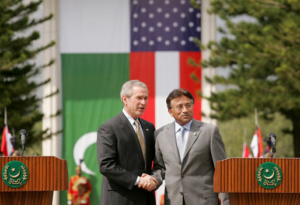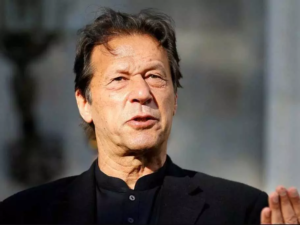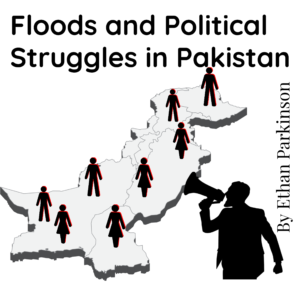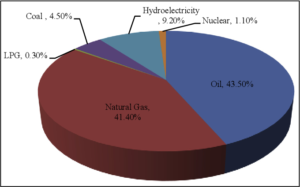November 22nd, 2022
Imran Khan and Recent History of Pakistan’s Leaders
Pakistan gained independence from the British Empire in 1947. For nearly 75 years Pakistan has continued to claw its way into a modern democratic country. Since its founding, Pakistan has been ruled by military chiefs, prime ministers, dictators, and a slew of other leaderly titles which when elected democratically have never served a full term. Pakistan has a dark history of political instability which has been positively changed in the 21st century. In the early 2,000s, Pakistan was ruled by General Pervez Musharraf who took power after a bloodless coup d’état. Musharraf governed Pakistan with an enlightened mindset in contrast to his predecessors. He implemented social liberalism and extensive economic reforms and due to his rule, the National Assembly of Pakistan was able to complete its first full five-year term in 2007. Musharraf was not free of mistakes though, he dedicated Pakistan to allying alongside the US in the war on terror which led to his impeachment. After impeachment in 2008, Pakistan came under many new rulers who were all ousted quickly due to their continual support and involvement in the United States’ war on terrorism which cost Pakistan an estimated $118B, 60,000 casualties, and 1.8M Pakistani civilians displaced. In the 2013 elections, Nawaz Sharif was elected prime minister for the third time in 14 years. Sharif ruled for 5 years before the 2018 elections where he was replaced by the leader of the Pakistan Tehreek-e-Insaf party, Imran Khan.
Imran Khan was a controversial leader of Pakistan. He has been constantly critiqued for his contradictions and hypocrisy. Most notably, his support of liberalism but constant appeasement of the Islamic clergy, his condemnation of Islamic terrorism but his public funding of the Pakistani Taliban, and his endorsement of free speech but his support for capital punishment under Pakistan’s blasphemy law. Imran Khan also did not have the legitimate government he claimed to have, with many Pakistani political figures calling his rise to power a “soft coup” backed by the Pakistani army. Imran Khan was ousted recently in April of 2022 after the national assembly filed a no-confidence motion. This was speculated to be because of the crash of the Pakistani economy, his attempts to tamper with the democratic processes in Pakistan, and his deceitful attempt at dissolving the Pakistani parliament before he was ousted. He was replaced by Shehbaz Sharif who has been dealing with the havoc that Khan left in his wake.
So, how does Imran Khan still affect Pakistan even when ousted from power? Khan still has strong and fierce support from the more extreme factions of the Islamic clergy and a rising popularity in the youth and upper middle class. This support and his hatred of the US have seemed to push Khan to be more extreme in his rhetoric than ever, with his speeches in Islamabad, Karachi, and Lahore motioning towards a dangerous anti-democracy stance and extremist Islamic views. Imran Khan displays visibly what we as Canadians should be doing in terms of our support in overseas countries. If we as Canadians wish for a democratic, prosperous, and safe Pakistan we must dedicate ourselves to supporting Pakistan and showing what a Pakistani government can achieve without discarding the democratic process. The best way to support a democratic Pakistan is by focusing our attention on Pakistan itself. If the world is watching, the citizens of Pakistan will recognize the support they have and continue to advocate and push for the betterment of Pakistan.
Floods, Causes, and Results
This past year has been one of the most difficult years for Pakistan in a while. With political disruption early in the year, Pakistan was destabilized and extremely vulnerable to the shocking floods that came not soon after. Pakistan usually expects colossal monsoon rains every summer but the rains this year came early and coupled with glacier melt from the Himalayas led to devastating floods in all of Pakistan except for the Punjab province. A report by OCHA shows that as of mid-October over 1,700 people have died, 13,000 injured, 436 bridges destroyed, 13,000 roads ruined, and over 2M homes wrecked. So, as shown in the statistics, these floods have not only claimed the lives and livelihoods of thousands of Pakistanis but also have shattered a large portion of Pakistan’s infrastructure. These floods are a reminder to Canadians as to how privileged we are to live in Canada and more importantly, what we can do with the voices and resources that we possess to aid people in vulnerable countries.
Sherry Rehman, the minister of climate affairs, reported that the Sindh and Balochistan provinces have received more rainfall on average this season by factors of 784% and 500%. This has been collectively agreed upon by international climate scientists to be due to climate change and more specifically, due to the rapid use of dirty fossil fuels in the Indian subcontinent. This is a problem that has been overlooked heavily in mainstream media. It is an intricate dilemma for rapidly developing countries like Pakistan, India, Bangladesh, and Sri Lanka which all have enormous populations with rapid modernization in their energy sectors. Currently, natural gas accounts for 40% of all of the Indian subcontinent’s energy consumption with the remaining percentage being taken up by oil, coal, and sparing renewable resources. This problem is one that needs to be addressed, because how do we as Canadians have any right to tell a developing country with massive populations starving for modern technology, that they should halt their rapid development in favor of progressing slower through renewable energy? This problem falls to international climate activists, to answer if the protection of our environment is worth the gatekeeping of modern technology from millions of Pakistanis and Indians.
These floods are catastrophic tragedies but they are not unique. In the recent years of the 21st century, nearly all of Asia from Pakistan in the west, to Japan in the east has been thrashed by natural disasters ranging from typhoons to droughts. Currently, due to these floods, millions have been displaced with thousands wounded or killed. This has been a tragic event in human history with natural disasters and is acting heavily as a message for climate activism. But, what should be further emphasized is how the Pakistani government and primarily its people have responded to this cataclysm. Since the floods began in June of this year we have seen massive technological development in Pakistan to combat floods. We have seen that these people have a dedication to their home and country. This is why it is crucial that we as Canadians contribute to aiding the people of Pakistan for not only their survival but also the lessons that we can learn from this when it will eventually happen again in another region so that this level of destruction can be prevented.
By Ethan Parkinson
Categories: Editorials





